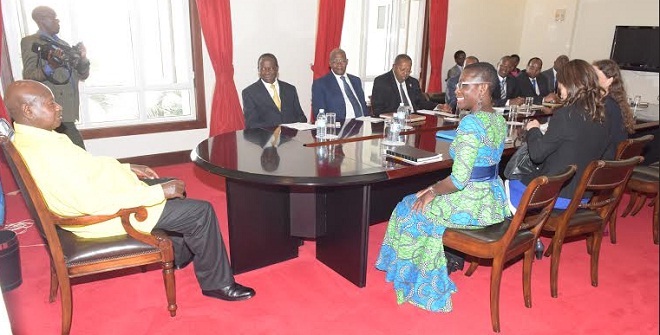
The government has already set out five priority areas of agriculture, tourism, minerals, oil and gas infrastructure and human capital development as the important sectors that would propel the economy into middle income status.
The government hopes that its emphasis on developing infrastructural hardware, innovation and improved security could fast-track the country’s economic development and elevate it to the desirable economic status.
Officials at NPA also say reduction of production costs, improving electricity supply and putting in place a faster mode of transporting goods and raw materials to and from the East African coast would also help in pushing Uganda forward.
To be a middle income economy, according to the World Bank, a country must have per capita Gross National Income of between $1,045 and above $12,746. Below $4,125 is ‘lower-middle income’; those between $4,125 and $12,746 are “upper middle income”, and those above $12,746 are in the bracket of “high income.”
Based on that computation, oil-producing Equatorial Guinea with a population of under a million people has a per capita income of about $20,500, making it the only high income country on the African continent.
Nigeria, which is Africa’s largest economy with a GDP of over $520 billion, is a lower middle income country; largely because of its large population. About 10 countries are in the upper middle-income category.
These include Angola, Botswana, Algeria, Gabon, Libya, Mauritius, Namibia, Seychelles, Tunisia, and South Africa. Over 15 African countries fall in the lower middle income bracket. They include Ivory Coast, Kenya, Cameroon, DR Congo, Cape Verde, Djibouti, Egypt, Ghana, Lesotho, Morocco, Mauritania, Sudan, Senegal, South Sudan, São Tomé and Principe, Swaziland and Zambia.
To achieve middle income status between now and 2020, Uganda’s economy must consistently grow at rates of 6%. According to knowledgeable observers like Francis Kamulegeya, the Country Senior Partner at the international management firm PricehouseCoopers, that is achievable only if the population growth rate remains at the current 3%.
According to the IMF, Uganda’s GDP growth will not hit the target of 6.3% in the next two years. That is the benchmark growth rate of the second phase of the National Development Plan (NDPII) that is supposed to propel Uganda into a middle income economy. Instead the IMF predicts that the country’s GDP will grow by around 5% in 2015; 5.3% in 2016 and 5.7% in 2017.
Stephen Kaboyo, the Managing Director at Alpha Capital Partners, a local financial advisory firm also told The Independent that Uganda needs improvements in infrastructure, a better business environment; investment in human capital, diversification of the economy to achieve middle income status.
“Achieving the above will not be easy because of capacity and resource constraints,” Kaboyo said.
Other economy experts say that if Uganda is to attain middle income status in a short time, it needs to carefully coordinate its macroeconomic, industrial, financial, and market policies. The economy needs to register consistently higher growth rates than current levels.
 The Independent Uganda: You get the Truth we Pay the Price
The Independent Uganda: You get the Truth we Pay the Price




It is as imposible an it be to attain a middle income status in 2020, but anyway why doesn’t the presedendent concentrate on knowledge creation rather than chase wild dreams that may not materialise soon, wealth creation can not create knowledge but knowledge can create wealthy. So forget middle income status and first concentrate on knowledge creation.
Oil money should be seen as a bonus that will compliment growth, but not a key driver to growth, it is only strategic abilities that will give uganda strategic competence which will then put the country in a competitive position, this will eventually lead to gaining a competitive advantage over our neighbours in trading.
THIS is just something else to use to hang onto power citing “unfinished business”.As Bantu rightly says , we have had “comparative advantage” that we have not made use of for the last 30 years and now we are talking about KIIRA cars.That informs the strategy we have and as they say ” a fortune in the hands of a fool is a big MISFORTUNE”. From “MY OIL” we are now talking about “our oil” which leaves one to wonder when the transformation took place, because I have not heard of a flotation of shares whereby the hitherto private company of M 7 OIL SARL floated its shares and THE REPUBLIC OF UGANDA bought some.
OIL or no oil, I do not see us going anywhere in a hurry ,unless there is a change of management.
Leadership is about inspiration and maintaining confidence of he followers. For the faithful both inside and outside the country who can be inspired to strategies and work hard -not speculation; and depending on their numbers plus their abilities, it is a possible goal to achieve and be in the middle income bracket soon. Even if we missed the target, but having stretched as much as possible, that would still be ok. Everyone aspires to be rich. Let him go on the work of positive mobilizing of ALL including the opposition to participate effectively. We might attain.
You guys, I salute you both kamanyire and ejakait, for your input in these forums, also say keep it up, you are doing good job, to open people’s eyes, and I like it that your always active debenting and commenting.